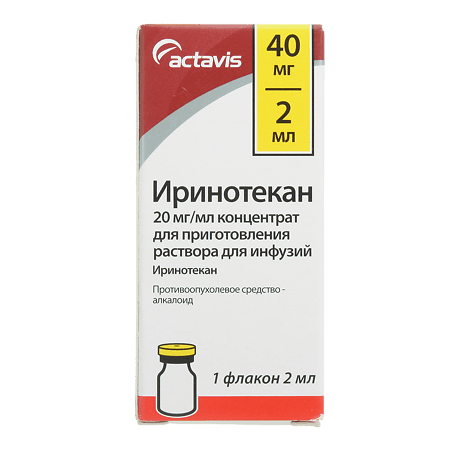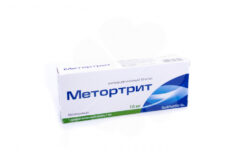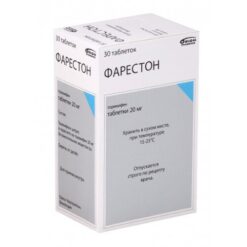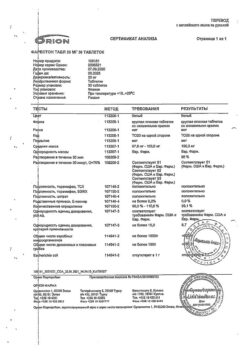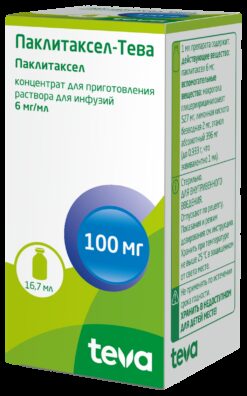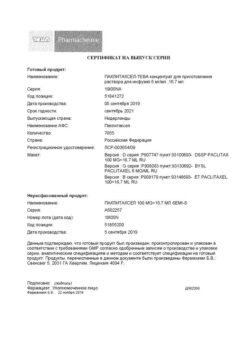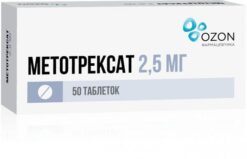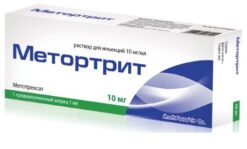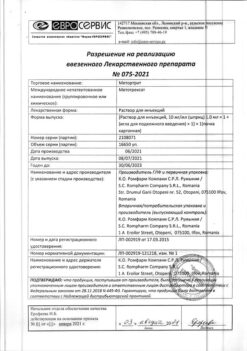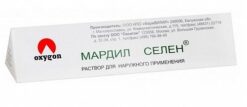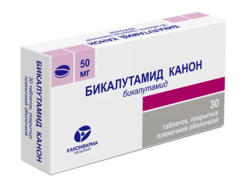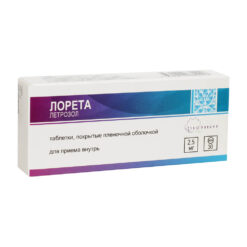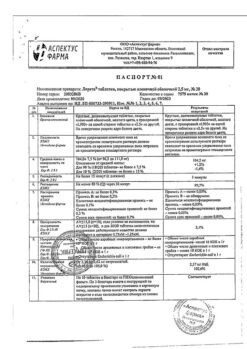No products in the cart.
Description
Irinotecan is a semi-synthetic derivative of camptothecin and is a specific inhibitor of the cellular enzyme topoisomerase I.
The drug is metabolized in tissues with the formation of the active metabolite SN-38, which is superior to irinotecan in its activity.
Irinotecan and metabolite SN-38 stabilize the topoisomerase I complex with DNA, which prevents its replication.
Indications
Indications
Locally advanced or metastatic colorectal cancer:
In combination with fluorouracil and calcium folinate in patients who have not previously received chemotherapy;
In monotherapy in patients with advanced disease after standard anti-tumor therapy.
Active ingredient
Active ingredient
Composition
Composition
1 ml contains:
Irinotecan hydrochloride trihydrate 20 mg.
Auxiliary substances:
sorbitol – 45 mg,
lactic acid – 900 µg,
sodium hydroxide – to pH3.5,
d/i water – up to 1 ml.
How to take, the dosage
How to take, the dosage
The drug is intended for adults only.
Irinotecan is administered as an IV infusion of at least 30 minutes and no longer than 90 minutes.
The specific literature should be consulted when choosing the dose and mode of administration in each individual case.
In monotherapy: Irinotecan is used at a dose of 350 mg/m2 every 3 weeks.
In combination chemotherapy, the dose of Irinotecan is:
– with fluorouracil and calcium folinate when administered weekly – 80 mg/m2;
– when administered by continuous infusion once/2 weeks – 180 mg/m2;
– in combination with fluorouracil and calcium folinate jetting – 125 mg/m2 weekly.
The doses and mode of administration of fluorouracil and calcium folinate are described in detail in the specialized literature.
The administration of Irinotecan should not be given until the neutrophil count in the peripheral blood exceeds 1500 cells/μL and until complications such as nausea, vomiting and especially diarrhea have completely resolved. Injection may be delayed for 1 to 2 weeks until all side effects have resolved.
. If marked suppression of medullary hematopoiesis develops against the background of treatment (neutrophil count less than 500/μL, and/or leukocyte count less than 1000/μL, and/or platelet count less than 100000/μL), febrile neutropenia (neutrophil count of 1000/μL or less in combination with a body temperature of over 38°C), infectious complications, severe diarrhea, or other non-hematologic toxicity of grade 3-4, subsequent doses of Irinotecan and fluorouracil should be reduced by 15-20% if necessary.
Patients with impaired liver function. Bilirubin level in serum is not more than 1.5 times higher than the upper limit of normal, due to the increased risk of severe neutropenia the patient’s blood values should be carefully controlled. In case of bilirubin level increase more than 1.5 times – treatment with Irinotecan should be stopped.
Patients with impaired renal function.
Interaction
Interaction
As irinotecan has anticholinesterase activity, the duration of neuromuscular blockade in co-administration with suxamethonium salts and antagonistic interaction regarding neuromuscular blockade in combination with nondepolarizing myorelaxants may be increased.
When irinotecan is coadministered with myelosuppressive drugs and radiation therapy the toxic effects on bone marrow (leukopenia, thrombocytopenia) are aggravated.
The co-administration of irinotecan with glucocorticosteroid drugs (e.g., dexamethasone) increases the risk of hyperglycemia (especially in diabetic patients or with glucose intolerance) and lymphocytopenia.
When irinotecan is coadministered with diuretics, dehydration due to diarrhea and vomiting may be aggravated.
The co-administration of irinotecan and prochlorperazine increases the likelihood of signs of akathisia.
When irinotecan is co-administered with herbal preparations based on Hypericum perforatum ( Hypericum perforatum) and with antiepileptic drugs CYP3A inducers (carbamazepine, phenobarbital and phenytoin) the plasma concentration of the active metabolite SN-38 is reduced.
The co-administration of irinotecan with atazanavir, CYP3A4 and UGT1A1 enzyme inhibitor, and ketoconazole may cause an increase in plasma concentration of the active metabolite SN-38.
Irinotecan should not be mixed with other drugs in the same vial.
Special Instructions
Special Instructions
The treatment with Irinotecan should be carried out in specialized chemotherapy departments under the supervision of a physician experienced in working with antitumor drugs.
In patients receiving irinotecan, a weekly gross clinical blood count should be performed and liver function should be monitored.
Diarrhea as a consequence of cytotoxic effects of the drug usually occurs no earlier than 24 hours after irinotecan administration (in most patients on average 5 days). At the appearance of the first episode of liquid stools it is necessary to administer abundant drinking containing electrolytes and immediate antidiarrheal therapy, including administration of loperamide in high doses (4 mg at first administration and then 2 mg every 2 hours).
This therapy is continued for at least 12 hours after the last episode of liquid stool, but no longer than 48 hours because of the possibility of small bowel paralysis. If diarrhea is considered severe (more than 6 episodes of liquid stools during 24 hours or marked tenesmus), or if accompanied by vomiting or fever, the patient should be transferred urgently to an intensive care unit for complex treatment, including administration of broad-spectrum antibiotics.
In case of moderate or slight diarrhea (less than 6 episodes of liquid stools during 24 hours and moderate tenesmus) that does not relieve within the first 48 h there should be started broad spectrum antibiotics orally. If diarrhea and severe neutropenia (leukocyte count less than 500/μL) occur simultaneously, broad-spectrum antibiotics are administered orally in addition to antidiarrheal therapy for prophylactic purposes.
During treatment with irinotecan, do not take preparations based on Hypericum perforatum, antiepileptic drugs (carbamazepine, phenobarbital and phenytoin), atazanavir and ketoconazole, which alter clearance of irinotecan. Loperamide should not be administered prophylactically, including in patients who have had diarrhea during previous injections of irinotecan.
The patient should be warned in advance about the possibility of delayed diarrhea. Patients should inform their physician immediately of the occurrence of diarrhea and initiate appropriate treatment immediately.
If diarrhea is not adequately treated, it can lead to life-threatening conditions, particularly if there is a background of neutropenia.
Patients with febrile neutropenia (body temperature ⥠38°C and neutrophil count â¤1000/µL) should start broad-spectrum antibiotics without delay in a hospital setting.
Acute cholinergic syndrome, which usually occurs during or within the first 24 h after drug administration, is quickly and effectively treated by subcutaneous injection of 0.25 mg atropine (caution should be exercised in patients with bronchial asthma).
The dosage form of the drug contains sorbitol as an excipient; therefore, Irinotecan should not be used in patients with hereditary fructose intolerance.
Trustworthy contraception must be used during treatment with Irinotecan and for at least three months after discontinuation of therapy.
In case of Irinotecan contact with skin or mucous membranes the skin should be washed immediately with soap and water, mucous membranes with just water.
Patients should be warned about the possibility of dizziness and visual disturbances during treatment with Irinotecan which develop within 24 hours after administration. If these symptoms occur, patients are advised to refrain from driving and engaging in other potentially hazardous activities that require increased concentration and rapid psychomotor reactions.
Contraindications
Contraindications
– chronic inflammatory bowel disease and/or impaired intestinal patency;
– marked suppression of medullary hematopoiesis;
– serum bilirubin level greater than 1.5 times VGN;
– patients’ general condition as assessed by the WHO scale >2;
– pregnancy and breastfeeding period;
– childhood (no data on safety and efficacy in children);
– hypersensitivity to irinotecan or other components of the drug.
With caution: radiation therapy (history) to the abdomen or pelvis, leukocytosis, female patients (increased risk of diarrhea).
Side effects
Side effects
Blood organs: neutropenia is observed in an average of 80% of patients, including half of them with a decrease of neutrophils less than 1000 cells per 1 µl. Recovery of neutrophils number is usually observed in 7-20 days from the treatment start. Anemia of varying severity occurs on average in 60% of patients, thrombocytopenia – in 7% of patients. One case of thrombocytopenia with formation of antiplatelet antibodies has been described.
Digestive system disorders: late-onset diarrhea occurring more than 24 hours (5 days on average) after drug administration is a dose-limiting toxic manifestation and is seen in approximately 87% of patients, with severe diarrhea in 38%. Nausea and vomiting usually occurs on the first day of administration or 24 h later in 85% of patients. Dehydration against the background of vomiting and diarrhea has been reported, very rarely with the development of renal failure, hypotension and heart failure. Abdominal pain, anorexia, mucositis, constipation are possible.
Acute cholinergic syndrome: seen in 9% of patients during the first 24 hours after administration of the drug and is manifested by diarrhea, abdominal pain, increased sweating, miosis, visual disturbances, lacrimation, salivation, decreased blood pressure, dizziness, chills and general malaise.
Central nervous system disorders: involuntary muscle twitching or convulsions, paresthesias, asthenia.
Allergic reactions: rare – skin rash and very rare – the development of anaphylactic shock.
Others: shortness of breath, increased body temperature, local reactions.
Overdose
Overdose
The main expected manifestations of overdose are neutropenia and diarrhea.
The specific antidote to irinotecan is unknown. Treatment is symptomatic.
In case of overdose, the patient should be hospitalized and the function of vital organs carefully monitored.
Additional information
| Manufacturer | S.C. Sindan-Pharma S.R.L., Romania |
|---|---|
| Medication form | solution for infusion |
| Brand | S.C. Sindan-Pharma S.R.L. |
Related products
Buy Irinotecan-Teva 20 mg/ml 2 ml, 1pc. with delivery to USA, UK, Europe and over 120 other countries.

